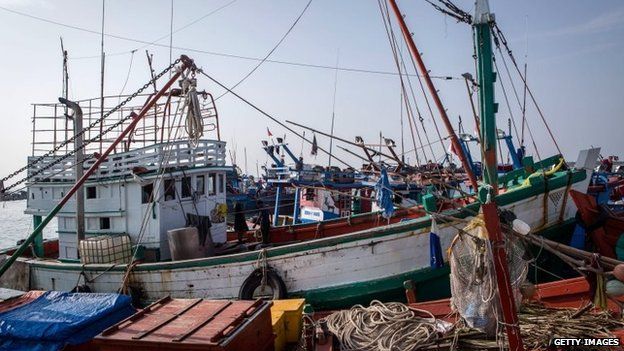Myanmar Rohingya migrants trapped without supplies
- Published

A group of 350 migrants from Myanmar have told an activist by phone that they have been stranded at sea without food or water for four days.
The migrants, including 50 women and 84 children, say that many people are now falling ill after the boat crew abandoned them at the weekend.
Their exact position is still unclear, said Chris Lewa of the Arakan Project which works with the Rohingya minority.
Indonesia and Malaysia have been turning away migrant boats.
Thailand has launched a crackdown to disrupt people smuggler networks since the discovery of dozens of bodies in abandoned camps along regular trafficking routes.
No help
A ship passed by the drifting ship on Tuesday but did not stop.
"I heard the boat's engine and then all the people screaming, shouting for help, trying to get attention - then the noises faded away and it became very quiet. All I could hear was the children crying," Ms Lewa told the BBC on Wednesday.
The migrants have been at sea for two months but their situation only became critical once their crew abandoned the boat and left them without a working engine.
Ms Lewa said that the migrants could see land but could not reach it. "They have a compass but no-one knows how to use it," she added.
On Tuesday, the migrants thought they might be close to the Malaysian island of Langkawi.
There is growing concern over the health of some of the passengers.
"One man said some people had died but others later contradicted him so the situation is very unclear," said Ms Lewa.
As many as 8,000 migrants from Bangladesh and Myanmar are believed by the International Organization for Migration (IOM) to be stranded at sea.
People smugglers are reportedly refusing to land their boats because they do not want to follow their usual route through Thailand after the government launched a campaign there against them.
Jeff Labovitz, an IOM spokesman, told the BBC on Monday that the discovery last week of the remains of dozens of people in abandoned camps in the south of Thailand had prompted a police crackdown.
Another IOM spokesman, Joe Lowry, said that many on board the migrant boats needed urgent help because they were suffering from beriberi - a disease caused by vitamin deficiency which "leaves you like a walking skeleton".
Ms Lewa said that some people in Myanmar were no longer attempting the perilous journey.
'Boat people'
Two boats which originally intended to leave last week have been disembarked, she said. More than 200 passengers were forced to pay a fee to be allowed to leave the vessels.
Five other boats however were reported to have set out regardless of the dangers.
On Tuesday, Indonesia said it had turned away a boat carrying hundreds of migrants believed to be from Myanmar and Bangladesh. What has happened to them is not yet known.
A senior Thai official told Reuters news agency on Wednesday that Thailand, Malaysia and Indonesia would all continue to turn the boats away.
Who are the Rohingyas?
- Rohingyas are a distinct, Muslim ethnic group mainly living in Myanmar, which is also known as Burma
- Thought to be descended from Muslim traders who settled there more than 1,000 years ago
- Also live in Bangladesh, Saudi Arabia and Pakistan
- In Myanmar, they are regularly persecuted - subjected to forced labour, have no land rights, and are heavily restricted
- In Bangladesh many are also desperately poor, with no documents or job prospects
Major General Werachon Sukhondhapatipak said that the three countries had decided "not to receive boat people".
On Sunday and Monday more than 2,000 migrants arrived in Malaysia or Indonesia after being rescued or swimming ashore.
The journey the migrants take - from Bangladesh or Myanmar through the Bay of Bengal to Thailand or beyond - takes several weeks. They have been slowed further by the refugees effectively being held hostage by smugglers.
- Published25 November 2012
- Published23 July 2012